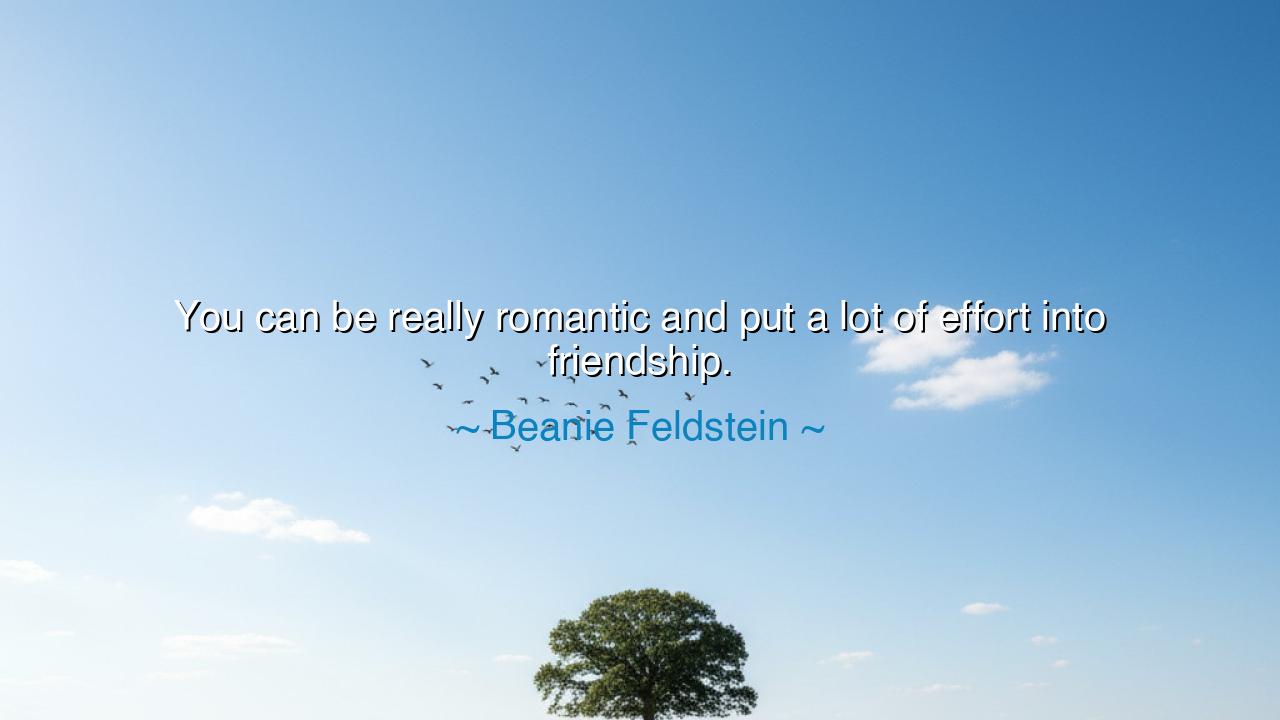
You can be really romantic and put a lot of effort into






In the heartfelt and luminous words of Beanie Feldstein, an actress and voice of modern sincerity, there rests a truth both tender and timeless: “You can be really romantic and put a lot of effort into friendship.” Though simple in sound, this saying strikes at the very soul of human connection. It calls us to see that romance, that art of wonder and devotion so often reserved for lovers, belongs just as fully to the realm of friendship. It reminds us that affection between friends, when tended with care, can be as radiant, as deep, and as soul-shaping as any love that poets sing of. In her words lies a gentle rebellion — a rejection of the idea that only romantic love deserves passion, creativity, and reverence.
The origin of this insight comes not from ancient scrolls or royal courts, but from the living heart of modern experience. Beanie Feldstein, speaking of her own relationships, saw that the truest friendships require more than casual affection — they demand effort, imagination, and deliberate tenderness. In a world that often prizes romance above all else, she dared to celebrate the quieter bonds that sustain us daily: the friends who hold us when the world breaks us, who rejoice in our joys as if they were their own. Feldstein’s words are not a rejection of romance, but an expansion of it — a reminder that love wears many faces, and that friendship, too, can be a sanctuary of devotion.
To say that one can be “really romantic” in friendship is to say that one can approach it with the same reverence and creativity with which lovers approach each other. For romance, in its truest sense, is not about roses or moonlight, but about the intentional celebration of the other person’s soul. It is the art of seeing beauty in another and reflecting it back to them. To write a letter to a friend in gratitude, to bring them comfort in their loneliness, to surprise them with laughter when they are weary — these are the acts of romance in friendship. Such gestures declare, without words, “Your existence is precious to me.” This is the kind of love that ennobles both giver and receiver — a love that does not desire to possess, but to uplift.
The ancients understood this truth, though they named it differently. The Greeks called it philia, the noble friendship that exists between kindred souls. Aristotle spoke of it as the highest form of love, greater even than passion, for it is rooted in virtue and choice. In this light, Feldstein’s words carry the spirit of the philosophers — the belief that friendship, when pursued with the heart’s full attention, becomes a form of worship. Consider the bond between David and Jonathan in the ancient scriptures. Their friendship was not casual or convenient; it was profound, sacrificial, and enduring. Jonathan risked his life and throne for David’s safety, and David, when his friend was gone, mourned him with a lament that has echoed through millennia: “Thy love to me was wonderful, passing the love of women.” This was friendship at its most romantic — not in desire, but in devotion.
The modern world, however, has forgotten much of this. It often treats friendship as something easy, something to be maintained through convenience and proximity. But true friendship, like love, demands effort. It must be nurtured through time, honesty, and presence. When Beanie Feldstein urges us to put “a lot of effort into friendship,” she invites us to restore sacredness to the act of being a friend — to reach out, to listen deeply, to celebrate our companions not out of duty, but out of genuine affection. For just as a lover plans a surprise or writes a poem, so too can a friend build small rituals of care — a shared meal, a heartfelt message, a quiet act of loyalty when no one is watching.
We might see this spirit in history as well. Think of Helen Keller and Anne Sullivan, two souls bound not by romance, but by an extraordinary friendship that transformed both their lives. Anne, who devoted her life to teaching Helen how to communicate, poured her every ounce of patience, imagination, and hope into her friend’s growth. And Helen, in turn, gave Anne eternal gratitude and love. Their bond, built on relentless effort and unselfish devotion, illuminated the world — showing that friendship, when pursued with all the heart’s strength, becomes a kind of romantic faith: a belief in the power of human connection to redeem and transcend.
So, my child, take this teaching to heart: do not save your tenderness only for lovers. Let your friendships, too, be filled with romance — not of passion, but of presence. Write letters. Keep promises. Celebrate your friends as though they were miracles, for they are. Let them know, by your actions, that their lives are cherished. When you put effort into friendship, you turn ordinary days into holy days, and ordinary hearts into sanctuaries of love.
For in the end, as Beanie Feldstein reminds us, friendship is not lesser than love — it is love, made humble, patient, and enduring. When you treat friendship with the same reverence you give to romance, you discover something wondrous: that love is not a single flame, but a constellation of lights, shining across the vast sky of your life. Tend those stars with care, and your world will never again be dark.






AAdministratorAdministrator
Welcome, honored guests. Please leave a comment, we will respond soon